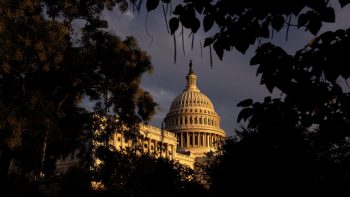U.S. costs for Libya could rack up fast
Kai Ryssdal: Here’s an news bulletin I read on the wires before I came into the studio. Reuters quoting an anonymous American official as saying, “U.S. expects to see more Arab participation in Libya effort over next several days.” That comes as the coalition enforcing the no-fly zone launched another two dozen Tomahawk missiles at $750,000 apiece.
An Air Force F-15 had mechanical problems and crashed. The crew is safe but the jet’s a $40 million write-off. You start talking dollar amounts like that, and you get to $1 billion pretty fast. And that matters because a billion’s how much the Pentagon says it can spend out of straight cashflow without having to go to Congress for a supplemental budget. So Washington probably is expecting to see more Arab participation soon, because Congress hasn’t been much in the mood to spend money lately.
Marketplace’s John Dimsdale reports.
John Dimsdale: For now, the Defense Department is drawing on existing accounts to cover the Libyan operation. But federal tax expert David Selig says the Pentagon:
David Selig: Easily could end up spending $100 billion by the end of the summer if we’re not careful.
Eventually Congress will get the bill, and if lawmakers want to cut deficits, Robert Bixby of the budget-watchdog Concord Coalition says it’s time to take a stand.
Robert Bixby: They should either raise revenue to pay for it or they could cancel some other defense spending, or some spending in the domestic accounts to offset the supplemental that they would need for Libya.
Bixby’s worry is that Congress will treat the request the same way it dealt with Iraq and Afghanistan.
Bixby: They may go back to the old emergency exemption, which is that anything that people label an emergency they don’t need to pay for. But the deficit itself is becoming an emergency and so I think that we are going to have to start paying for things, even if they’re things we want to do.
There is another option, says Anthony Cordesman at the Center for Strategic and International Studies.
Anthony Cordesman: Now Libya’s surface-based air defense system has largely been suppressed, you can shift the mission over to manned aircraft from Britain, France and other countries, and shift the costs as well.
So far Congress has aimed its budget cutting firepower on non-defense spending. The president’s decision to join military action in Libya will force lawmakers to set their sights on the Pentagon as well.
In Washington, I’m John Dimsdale for Marketplace.
There’s a lot happening in the world. Through it all, Marketplace is here for you.
You rely on Marketplace to break down the world’s events and tell you how it affects you in a fact-based, approachable way. We rely on your financial support to keep making that possible.
Your donation today powers the independent journalism that you rely on. For just $5/month, you can help sustain Marketplace so we can keep reporting on the things that matter to you.


















